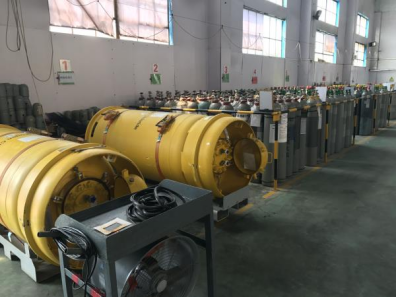bagaimana bisa kita membantu kamu
Hydrogen chloride, with the chemical formula HCl, is a colorless gas with a pungent odor. A hydrogen chloride molecule is composed of one chlorine atom and one hydrogen atom. Its aqueous solution is called hydrochloric acid, also known as hydrochloric acid. Hydrogen chloride is very soluble in water. At 0°C, 1 volume of water can dissolve approximately 500 volumes of hydrogen chloride. Melting point -114.2℃, boiling point -85℃, does not burn in air, is thermally stable, and does not decompose until about 1500℃. It has a suffocating odor, is highly irritating to the upper respiratory tract, and is corrosive to eyes, skin, and mucous membranes. The density is greater than that of air, its aqueous solution is hydrochloric acid, and concentrated hydrochloric acid is volatile.
 Image source: Baidu
Image source: Baidu| Hydrogen chloride gas concentration | symptom |
| 9ppm | Begins to falter, but tolerable for six hours |
| 10ppm | Beginnings are influential |
| 35ppm | Tolerable for 10 minutes, but sneezing affects the throat, hoarseness, suffocation and chest pressure |
| 10-50ppm | Can work, can't work if inhaled for a long time |
| 40-90ppm | It can be tolerated for 0.5 to 1 hour, and there will be no hindrance in the future |
| 1000-1350ppm | There is a risk within 0.5 to 1 hour |
| 1250-1750ppm, | Died within 0.5 to 1 hour or after 1 hour |
For the detection of hydrogen chloride gas concentration in the chlorine industry, ISWEEK recommends the following electrochemical gas sensors for the detection of gas in the chlorine industry.

British Alphasense hydrogen chloride sensor - HCL-A1
hydrogen chloride sensor - HCL-A1 electrochemical sensor has high sensitivity, good selectivity, can filter dust and small water droplets, low concentration output linearity, good stability, anti-SO2, H2, CO, C2H4 , CO2, NH3 interference and other advantages, the measuring range is 0~100ppm, the working environment is -30~50℃, 15~90%RH, and the resolution is 1ppm. It is mainly used in hand-held HCL alarms, chemical industry and other industrial fields.

British Alphasense hydrogen chloride sensor - HCL-B1
hydrogen chloride sensor - HCL-B1 electrochemical sensor has high sensitivity, good selectivity, can filter dust and small water droplets, low concentration output linearity, good stability, anti-SO2, H2, CO, C2H4 , CO2, NH3 interference and other advantages, the range is 0~100ppm, the working environment is -30~50℃, 15~90%RH, the resolution is 0.1ppm, mainly used in fixed HCL alarms, chemical industry and other industrial fields.